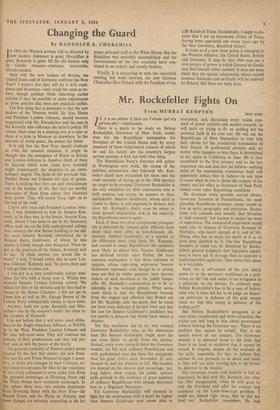Changing the Guard
By RANDOLPH S. CHURCHILL
TN 1964 the Western powers will be directed by new leaders. Adenauer is gone, Macmillan is gone, Kennedy is gone. Of the old leaders only,
de Gaulle remains--obdurate, intractable, bloody-minded.
How will the new leaders of Britain, the United States and of Germany confront the New Year? I suspect that they will do it with confi- dence and buoyancy—very much the same as be- fore; though perhaps while inheriting earlier policies it may be possible to make adjustments in those policies that were not practical earlier. The first thing that is necessary is that the new leaders of the Western world, Sir Alec Home and President Lyndon Johnson, should become acquainted with Mr. Khrushchev and the men in the Kremlin who influence the latter's policy. Of course, there must be a meeting two at a time or three at a time in Moscow or elsewhere. In the interests of world peace, the sooner the better.
It is odd that the New Year should confront us with this unusual situation. It might be thought that the emergence of Home in Britain and Lyndon Johnson in America (both of them by hazards which none could have foretold) might transmogrify the situation to an extra- ordinary degree. The facts of life preclude that. Neither Home nor Johnson are men of genius.
There is nothing that they can pull miraculously out of the hamper of life. But they are worthy successors of those from whom they inherited their power. They will surely 'keep right on to the end of the road.'
I have only once met President Lyndon John- son. I was introduced to him by Senator Ken- nedy, as he then was, in the Senate. Senator Ken- nedy, whom I had been to see in his Senatorial office, took me on the little underground railway that connects the new Senate building to the old.
En route Senator Kennedy introduced me to Senator Barry Goldwater, of whom he was
plainly a friend, though they disagreed. When we got to the precincts of the Senate, Kennedy said to me: 'Is there anyone you would like to meet?' I said, 'I would rather like to meet Lyn- don Johnson.' Kennedy said, 'Sit down there and I will get him to come out.'
I was put in a very comfortable leather arm- chair for two with a hood over it. Within two minutes Senator Lyndon Johnson arrived. We talked for five or six minutes and he then had to return to the Senate Chamber. I did not get to know him as well as Mr. George Brown of the Labour Party subsequently claims to have done.
Anyway, both are gone. Kennedy and Mac- millan—one by the assassin's bullet, the other by the accident of ill-health I do not believe that it will make much differ- ence to the Anglo-American Alliance, to NATO,
Or to the West. President Lyndon Johnson and Sir Alec will meet soon. They will continue the Policies of their predecessors and they will pre- vail; and so will the peace of the world.
The general continuity of Western policy seems assured by the fact that neither the new Presi- dent nor the new Prime Minister thought it neces- sary to make any changes in their Cabinets, ex- cept those forced upon Sir Alec by the reluctance 01 two of his colleagues to serve under him. Even the personal entourages at Downing Street and the White House have remained unchanged. In this sphere there were two notable departures from Downing Street with the New Year—Sir Harold Evans and Sir Philip de Zulueta, and some changes are certainly impending in the far
larger personal staff at the White House. But the transition was smoothly accomplished and the Governments of the two countries have con- tinued in an orderly and seemly fashion.
Finally, it is reassuring to note the successful meeting last week between the new German Chancellor Herr Erhard with the President at the LBJ Ranch in Texas. (Incidentally, I ought to dis- close that I am an honourary citizen of Texas, having been appointed one many years ago by the then Governor, Beauford Jester.) It looks as if a new inner group is emerging in the Western Alliance; the United States, Britain and Germany. It may be that 1964 may see a new pattern of power in which General de Gaulle may find himself rather isolated. It does not seem likely that the special relationship which existed between Adenauer and de Gaulle will be renewed by Erhard. But these are early days.






























 Previous page
Previous page